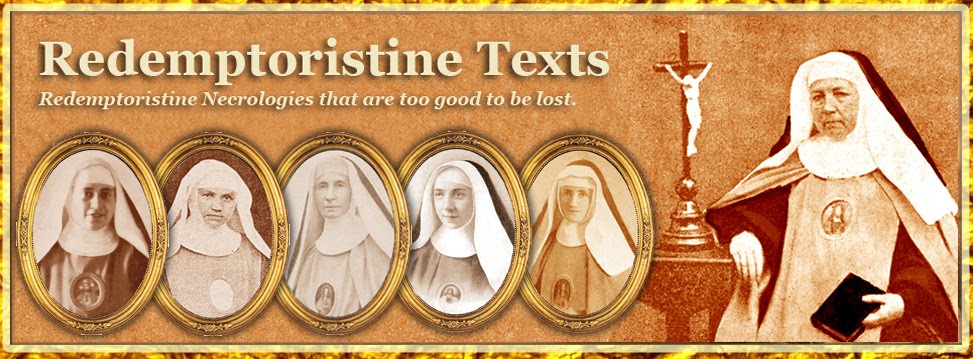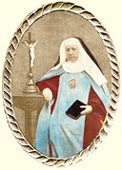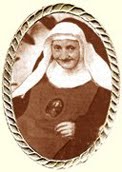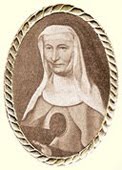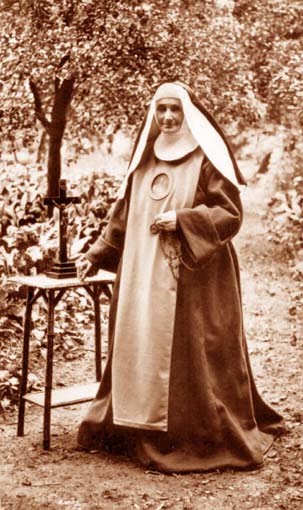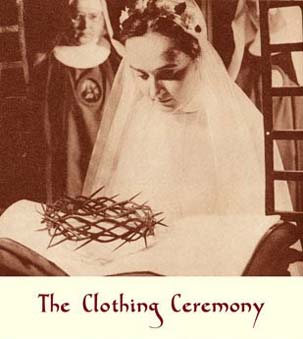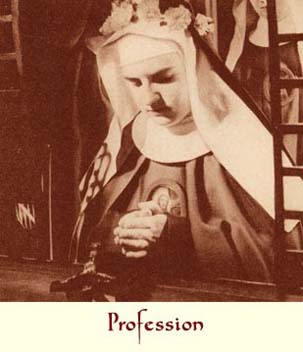Chapter II.
The Educand. - The Novice (1844-1846).
The Educand. - The Novice (1844-1846).
The house which welcomed the new arrival was no more than a provisional convent, occupied for the last two and a half years by the Redemptoristines, but in a state of dilapidation which they had scarcely been able to remedy. As Mother Mary-Aloyse was to write later on, “It was no more than an old house which let the cold and the wind enter through ill-fitting windows. Everything was freezing, even beside the fire, and the Sisters had nothing which could guarantee them against the worst of the weather.” But the Postulant, avid for sufferings and sacrifices, resolutely embraced this new life. Was she not happy to prove right from the beginning her love for Him who had called her there? The convent was small and cramped. It was but the little house, as it was to be called later on. The Monastery was under construction elsewhere, and this building work was absorbing all their resources. So poverty made its rigours felt, and the necessities were often lacking. But the Postulant never said a word to her family which could have led them to suspect anything. And she who was so used to the fresh country air, could only go and walk in the courtyard for ten minutes or so at midday. She slept at ground floor level in a paved room, in common with the other Educands. In brief, her privations were numerous.
The Postulant also quickly came to know temptations. Father Dechamps had predicted it, and in a letter dated 15th January 1844 from Liège, he wrote to her:
“My daughter in Jesus Christ,
“In war as in war, but you are quite astonished to be a soldier, aren’t you? The greatest enemy is he who throws dust in your eyes and who blurs your sight, the Father of Lies. What matters is go and tell your dear Superiors straight away all the stories he has put in your head. For example, the thought has been given to you with an evil intention that your parents will perhaps be left alone, that you will not be able to cope with this kind of life, etc. You see how wicked he is. He attacks you through fear, through tenderness and even through scruples, and then he make you afraid to ask any of those who are visible Providence to you what you ought to ask. - Courage! Find your weapons! Even to taking up a brush! - I used to know a religious, Father Villani [4] who received some very great graces through a brush .. when polishing his shoes. He didn’t exactly tell me, but I saw it and guessed it. I saw what happened. Sometimes he would polish some of his colleagues shoes, thinking all the time of the words of St. John the Baptist, 'I am not worthy, etc.'
“I am not surprised to hear that you are content with your pains. Jesus Christ is in the citadel when your enemies make a din in all the rest of the place. It is certainly consoling for you to take the place, so clearly and so providentially, of this good nun [5] who is already with St. Alphonsus, where she can show you to her Father, so that He may draw you to Himself.
“'But the virtues?' you will say. Patience, for they are bought little by little. But where do you begin? With simple observance. 'Think of me,' Our Lord said to St. Catherine of Siena, 'and I will think of you.' So leave Him to look after you.
“Everything is quite calm at home...
“As for the news-vendors, I hear nothing from here. Who knows if they are talking about you at Liège? A bit here and there, and then they’re off to the ball, the show, etc. The world is nothing.
“I pray to Saint Alénie [6] to make you love the dear little martyrdom of religious life more and more.”
This consoling letter was followed some time later by a missive from Father Manvuisse, our Postulant’s first director. What could be more interesting than to be present at her first steps in religious life, sustained by exhortations of these valiant servants of God!
Tournai, 20th.
“You have given me great pleasure by your letter, my dear child. I have been awaiting this missive for a long time! Actually, I congratulate you not so much for the triumph that you have obtained over all the difficulties that have faced you in your entry into religion, but regarding your other successes, no less important, that your letter proves, and these are the dispositions that you have. How happy I am that the first difficulties have now been overcome, and that you are facing the others quite cheerfully! Yes, no doubt convent life is a little different from that of the world and the spirit of the one is quite opposed to that of the other! A similar difference with the customs! Certainly your father would shout out aloud for joy if he knew that his daughter was subjected to the little trials of the refectory and so many others... But in actual fact, is there anything so dreadful about it, even for your self-esteem? When you have once committed yourself bravely, then the die is cast. Then you always experience a certain advantage, although it costs less, because you never become quite as proud again as you were before you abased yourself. Certainly the holy founders of Orders thought out things well.
“You are afraid in advance, my dear child, of the communications which you are to make to your future Mistress of Novices. Believe me, sufficient to each day is the evil thereof. When the time comes to open your heart, you will ask for strength and courage for it, and God will grant it to you. He gives everything you require to fulfil the duties that He imposes. Do not alarm yourself in advance. Didn’t you also have to change directors when you were in the world?
“And then, my daughter, try to keep up a brave face before your father when he comes to see you! Show yourself firm and do not speak of these trifling little humiliations or privations which you have to suffer in the convent. It is not worthwhile. Certainly the people of the world have many other things to gossip about!
“So then, courage, courage! Let us not recoil before various trials and even certain sacrifices. God sees and counts up everything, so as to reward you for everything.
“Farewell, my dear child. I bless you with all my soul.”
“Manvuisse, C. SS. R.”
Thus encouraged, Sister Mary-Aloyse set herself bravely to the task. If her energetic soul was at its ease from the first moments when she was in the midst of her privations, she was no less so in declaring war against her natural inclinations. A tendency to worry stemming from a certain eagerness for perfection and sanctity, perhaps a slight tendency to sarcasm, a liveliness which stemmed from her energetic temperament and which never admitted half-measures, were, we believe, the object of her struggles. But she was not lacking in courage. Based on her humble defiance of her own self, it was to work miracles.
Moreover, in this respect she found a solid support in the person of Mother Mary-Philomena of the Divine Providence, her Mistress of Educands. This excellent religious, a model of affability and fervour, brought along in her footsteps all those of whom she had charge. What better way to make her known than by citing the letter addressed by her later on to one of her subordinates?
“Dear Sister M.., you have asked me for some lines of consolation. Here is my reply. Before all else, dear child, I wish you to have courage. Even before the invention of the railways, St. Teresa said that with courage we could go at a hundred miles per hour. So courage is therefore the electric telegraph of the spiritual life. And why go on foot or in a stage-coach, when there is the railway or the telegraph at your disposal? I see that you still retain a trace of your long-time infirmity Discouragement. The Prince of Darkness tries to profit from it. Send him packing. Besides, you should never be discouraged or surprised when you see you are still imperfect. We do not become saints in a day, and God is pleased to leave us a feeble and vulnerable side so that we may constantly be humble and feel the enormous need that we have of Him! In your temptations, never think of the temptation, but of Jesus Christ and Mary, and in general, when your spirit wishes to dream and reflect and examine things, keep your eyes fixed cheerfully on the adorable image of Jesus Christ who is in you, [7] and his holy Mother who is beside you. You will find in them what you should dream about for all eternity.”
As it turned out, the good Mother Mary-Philomena never allowed either the educands or the novices placed under her direction time to dream. She led them sweetly, but firmly to the practice of solid virtues. One of her former subjects depicts this wonderfully: “Always pleasant and smiling to everyone, you could not meet up with her (if you were feeling out of sorts) without seeing your pain vanish. When you looked at her, because of her amiability, everything disappeared and changed for the better, as if an angel had suddenly appeared and chased all the demons away. She made the souls of her children pass through the thorns of great trials, according to the special needs of each one of them. She sometimes said to me, right at the beginning, “Don’t be one of those religious who need to be handled with kid gloves.”
Sister Mary-Aloyse was never one of these last. Her ideal, when she entered the Order, had been to consecrate herself entirely to Jesus Christ through the immolation of her own will, tastes and inclinations. She pursued it unswervingly, in spite of temptations and dislikes of every sort. “My God,” she writes about this time, “I wish to repair the past. What You ask of me is more than recollection, modesty, maintaining my religion, saying less mundane things in recreation, less concern with my own well-being, more affability and evenness of temper towards my Sisters; no longer permitting myself to be sarcastic, and no longer seeking to draw attention to myself.” So much for the correction of her faults. Now let us hear what she says about her own personal sanctity. “Oh my God, let me hide myself in You. I wish to suffer and be despised for You. Oh Jesus. Beginning from today, let me be converted seriously. No more sins, my God, for I have already offended You too much. Mary, my Mother, help me to imitate St. Luis de Gonzaga. To inspire myself to observance, I often think that Jesus Christ wanted to suffer and be tormented for love of me. Come, my soul, courage! In a short time to come, we must merit heaven. Let us suffer cheerfully for God. A suffering discovered is one pearl less in your crown. Long live Jesus! I wish to suffer and overcome myself. The more pain, the more merit!”
The pious educande took the habit on 6th January 1845. She received the name of Sister Mary-Aloyse of the Immaculate Heart of Mary. Her companion, Miss Mary Peters of Boxmeer (Holland), received the name of Sister Mary Scholastica of the Precious Blood. Mons. Corselis, the Vicar-General, officiated, and Rev. Father Paul Reyners gave a short address. Her mother and sister attended the ceremony. Her father came on his own later to pay her a visit. On the advice of Father Dechamps, Sister Mary-Aloyse of the Immaculate Heart of Mary had written him a sort “of letter of honourable satisfaction to paternal authority.” As she wrote in it of her pious director, her father, who was a Christian but too exclusively human “had good reason to believe” in his opposition. And she added, “it is not the contradictions which come from naughty children which is a great cross, but those that come from good ones. It was certainly to give you an occasion to practise patience, resignation and fidelity that God permitted so good a Christian to adhere to so false a point of view.” But everything ended in peace. Mr. Fabri finally understood that he had no more to dispute with God over his child, and so she was able, with joy in her heart and in concert with Sister Mary-Scholastica, to make her religious profession on 23rd January 1846. It was Mons. Boussen, the Bishop of Bruges (Brugge), who conducted the ceremony and Mons. Jacquemotte who made the usual speech. He highlighted the advantages, the obligations, and the rewards of the new life to which the two novices had been forever consecrated.
The Postulant also quickly came to know temptations. Father Dechamps had predicted it, and in a letter dated 15th January 1844 from Liège, he wrote to her:
“My daughter in Jesus Christ,
“In war as in war, but you are quite astonished to be a soldier, aren’t you? The greatest enemy is he who throws dust in your eyes and who blurs your sight, the Father of Lies. What matters is go and tell your dear Superiors straight away all the stories he has put in your head. For example, the thought has been given to you with an evil intention that your parents will perhaps be left alone, that you will not be able to cope with this kind of life, etc. You see how wicked he is. He attacks you through fear, through tenderness and even through scruples, and then he make you afraid to ask any of those who are visible Providence to you what you ought to ask. - Courage! Find your weapons! Even to taking up a brush! - I used to know a religious, Father Villani [4] who received some very great graces through a brush .. when polishing his shoes. He didn’t exactly tell me, but I saw it and guessed it. I saw what happened. Sometimes he would polish some of his colleagues shoes, thinking all the time of the words of St. John the Baptist, 'I am not worthy, etc.'
“I am not surprised to hear that you are content with your pains. Jesus Christ is in the citadel when your enemies make a din in all the rest of the place. It is certainly consoling for you to take the place, so clearly and so providentially, of this good nun [5] who is already with St. Alphonsus, where she can show you to her Father, so that He may draw you to Himself.
“'But the virtues?' you will say. Patience, for they are bought little by little. But where do you begin? With simple observance. 'Think of me,' Our Lord said to St. Catherine of Siena, 'and I will think of you.' So leave Him to look after you.
“Everything is quite calm at home...
“As for the news-vendors, I hear nothing from here. Who knows if they are talking about you at Liège? A bit here and there, and then they’re off to the ball, the show, etc. The world is nothing.
“I pray to Saint Alénie [6] to make you love the dear little martyrdom of religious life more and more.”
This consoling letter was followed some time later by a missive from Father Manvuisse, our Postulant’s first director. What could be more interesting than to be present at her first steps in religious life, sustained by exhortations of these valiant servants of God!
Tournai, 20th.
“You have given me great pleasure by your letter, my dear child. I have been awaiting this missive for a long time! Actually, I congratulate you not so much for the triumph that you have obtained over all the difficulties that have faced you in your entry into religion, but regarding your other successes, no less important, that your letter proves, and these are the dispositions that you have. How happy I am that the first difficulties have now been overcome, and that you are facing the others quite cheerfully! Yes, no doubt convent life is a little different from that of the world and the spirit of the one is quite opposed to that of the other! A similar difference with the customs! Certainly your father would shout out aloud for joy if he knew that his daughter was subjected to the little trials of the refectory and so many others... But in actual fact, is there anything so dreadful about it, even for your self-esteem? When you have once committed yourself bravely, then the die is cast. Then you always experience a certain advantage, although it costs less, because you never become quite as proud again as you were before you abased yourself. Certainly the holy founders of Orders thought out things well.
“You are afraid in advance, my dear child, of the communications which you are to make to your future Mistress of Novices. Believe me, sufficient to each day is the evil thereof. When the time comes to open your heart, you will ask for strength and courage for it, and God will grant it to you. He gives everything you require to fulfil the duties that He imposes. Do not alarm yourself in advance. Didn’t you also have to change directors when you were in the world?
“And then, my daughter, try to keep up a brave face before your father when he comes to see you! Show yourself firm and do not speak of these trifling little humiliations or privations which you have to suffer in the convent. It is not worthwhile. Certainly the people of the world have many other things to gossip about!
“So then, courage, courage! Let us not recoil before various trials and even certain sacrifices. God sees and counts up everything, so as to reward you for everything.
“Farewell, my dear child. I bless you with all my soul.”
“Manvuisse, C. SS. R.”
Thus encouraged, Sister Mary-Aloyse set herself bravely to the task. If her energetic soul was at its ease from the first moments when she was in the midst of her privations, she was no less so in declaring war against her natural inclinations. A tendency to worry stemming from a certain eagerness for perfection and sanctity, perhaps a slight tendency to sarcasm, a liveliness which stemmed from her energetic temperament and which never admitted half-measures, were, we believe, the object of her struggles. But she was not lacking in courage. Based on her humble defiance of her own self, it was to work miracles.
Moreover, in this respect she found a solid support in the person of Mother Mary-Philomena of the Divine Providence, her Mistress of Educands. This excellent religious, a model of affability and fervour, brought along in her footsteps all those of whom she had charge. What better way to make her known than by citing the letter addressed by her later on to one of her subordinates?
“Dear Sister M.., you have asked me for some lines of consolation. Here is my reply. Before all else, dear child, I wish you to have courage. Even before the invention of the railways, St. Teresa said that with courage we could go at a hundred miles per hour. So courage is therefore the electric telegraph of the spiritual life. And why go on foot or in a stage-coach, when there is the railway or the telegraph at your disposal? I see that you still retain a trace of your long-time infirmity Discouragement. The Prince of Darkness tries to profit from it. Send him packing. Besides, you should never be discouraged or surprised when you see you are still imperfect. We do not become saints in a day, and God is pleased to leave us a feeble and vulnerable side so that we may constantly be humble and feel the enormous need that we have of Him! In your temptations, never think of the temptation, but of Jesus Christ and Mary, and in general, when your spirit wishes to dream and reflect and examine things, keep your eyes fixed cheerfully on the adorable image of Jesus Christ who is in you, [7] and his holy Mother who is beside you. You will find in them what you should dream about for all eternity.”
As it turned out, the good Mother Mary-Philomena never allowed either the educands or the novices placed under her direction time to dream. She led them sweetly, but firmly to the practice of solid virtues. One of her former subjects depicts this wonderfully: “Always pleasant and smiling to everyone, you could not meet up with her (if you were feeling out of sorts) without seeing your pain vanish. When you looked at her, because of her amiability, everything disappeared and changed for the better, as if an angel had suddenly appeared and chased all the demons away. She made the souls of her children pass through the thorns of great trials, according to the special needs of each one of them. She sometimes said to me, right at the beginning, “Don’t be one of those religious who need to be handled with kid gloves.”
Sister Mary-Aloyse was never one of these last. Her ideal, when she entered the Order, had been to consecrate herself entirely to Jesus Christ through the immolation of her own will, tastes and inclinations. She pursued it unswervingly, in spite of temptations and dislikes of every sort. “My God,” she writes about this time, “I wish to repair the past. What You ask of me is more than recollection, modesty, maintaining my religion, saying less mundane things in recreation, less concern with my own well-being, more affability and evenness of temper towards my Sisters; no longer permitting myself to be sarcastic, and no longer seeking to draw attention to myself.” So much for the correction of her faults. Now let us hear what she says about her own personal sanctity. “Oh my God, let me hide myself in You. I wish to suffer and be despised for You. Oh Jesus. Beginning from today, let me be converted seriously. No more sins, my God, for I have already offended You too much. Mary, my Mother, help me to imitate St. Luis de Gonzaga. To inspire myself to observance, I often think that Jesus Christ wanted to suffer and be tormented for love of me. Come, my soul, courage! In a short time to come, we must merit heaven. Let us suffer cheerfully for God. A suffering discovered is one pearl less in your crown. Long live Jesus! I wish to suffer and overcome myself. The more pain, the more merit!”
The pious educande took the habit on 6th January 1845. She received the name of Sister Mary-Aloyse of the Immaculate Heart of Mary. Her companion, Miss Mary Peters of Boxmeer (Holland), received the name of Sister Mary Scholastica of the Precious Blood. Mons. Corselis, the Vicar-General, officiated, and Rev. Father Paul Reyners gave a short address. Her mother and sister attended the ceremony. Her father came on his own later to pay her a visit. On the advice of Father Dechamps, Sister Mary-Aloyse of the Immaculate Heart of Mary had written him a sort “of letter of honourable satisfaction to paternal authority.” As she wrote in it of her pious director, her father, who was a Christian but too exclusively human “had good reason to believe” in his opposition. And she added, “it is not the contradictions which come from naughty children which is a great cross, but those that come from good ones. It was certainly to give you an occasion to practise patience, resignation and fidelity that God permitted so good a Christian to adhere to so false a point of view.” But everything ended in peace. Mr. Fabri finally understood that he had no more to dispute with God over his child, and so she was able, with joy in her heart and in concert with Sister Mary-Scholastica, to make her religious profession on 23rd January 1846. It was Mons. Boussen, the Bishop of Bruges (Brugge), who conducted the ceremony and Mons. Jacquemotte who made the usual speech. He highlighted the advantages, the obligations, and the rewards of the new life to which the two novices had been forever consecrated.
Footnotes
[4] Canon Villain, from the Diocese of Tournai, entered the Congregation of the Most Holy Redeemer on 18th July 1835. He died at Saint-Trond in an odour of sanctity on 30th January 1838. He took the name of Father Villani in memory of the famous Father of this name, who was one of St. Alphonsus’ first companions.
[5] Sister Mary-Aloyse, who died on 23rd December 1843.
[6] St. Alénie, martyr in the Forest of Brabant (7th Century). Her relics are in the main altar of the church of the Redemptorist Fathers at Liège. When these relics were moved into the Fathers’ church, Father Dechamps published a little brochure to make this Saint more widely known.
[7] Christum habere per fidem in cordibus vestris. - St. Paul (To have Christ through faith in your hearts.)
[5] Sister Mary-Aloyse, who died on 23rd December 1843.
[6] St. Alénie, martyr in the Forest of Brabant (7th Century). Her relics are in the main altar of the church of the Redemptorist Fathers at Liège. When these relics were moved into the Fathers’ church, Father Dechamps published a little brochure to make this Saint more widely known.
[7] Christum habere per fidem in cordibus vestris. - St. Paul (To have Christ through faith in your hearts.)
This necrology is translated from Fleurs de l'Institut des Rédemptoristines by Mr John R. Bradbury. The copyright of this translation is the property of the Redemptoristine Nuns of Maitland, Australia. The integral version of the translated book will be posted here as the necrologies appear.
